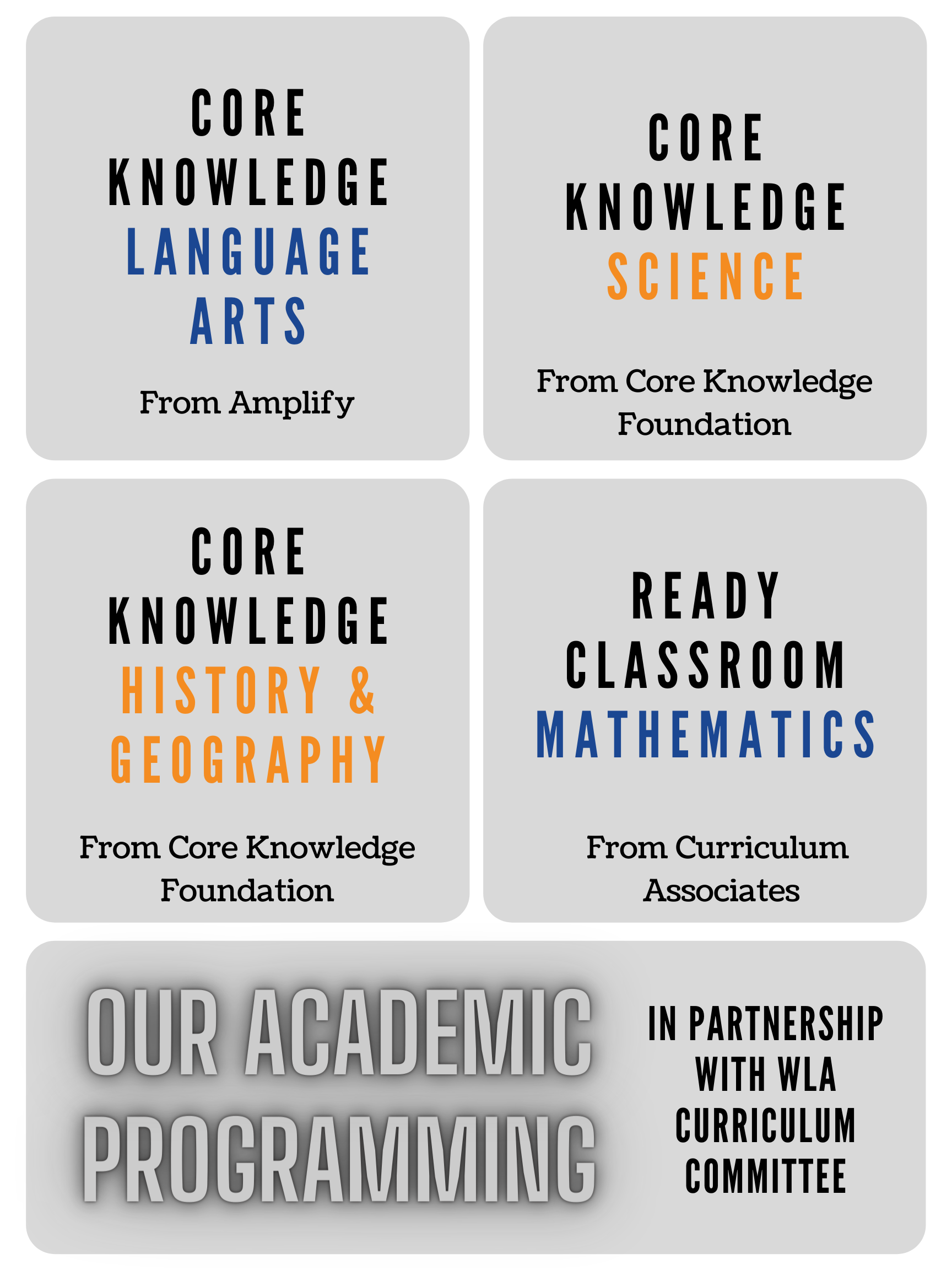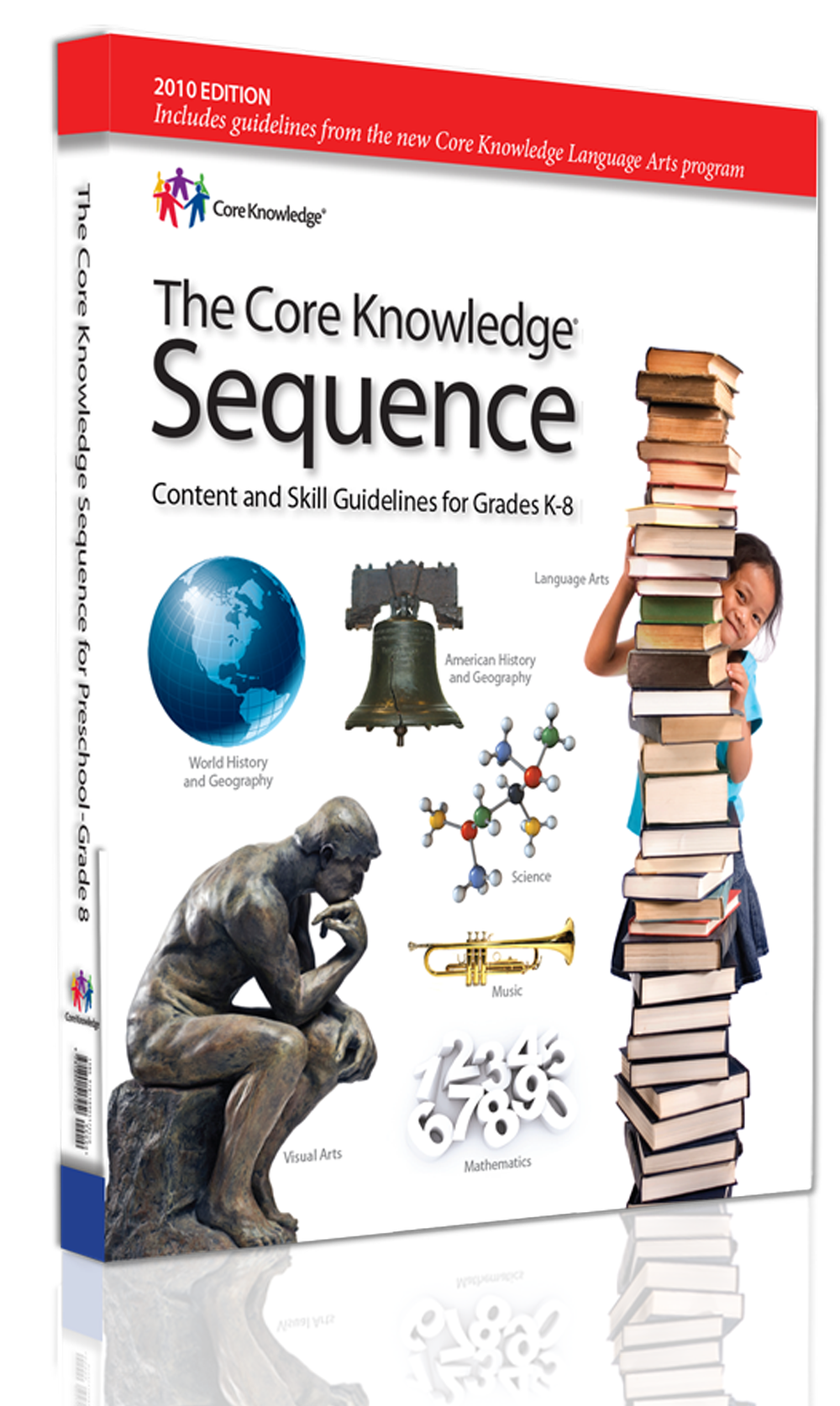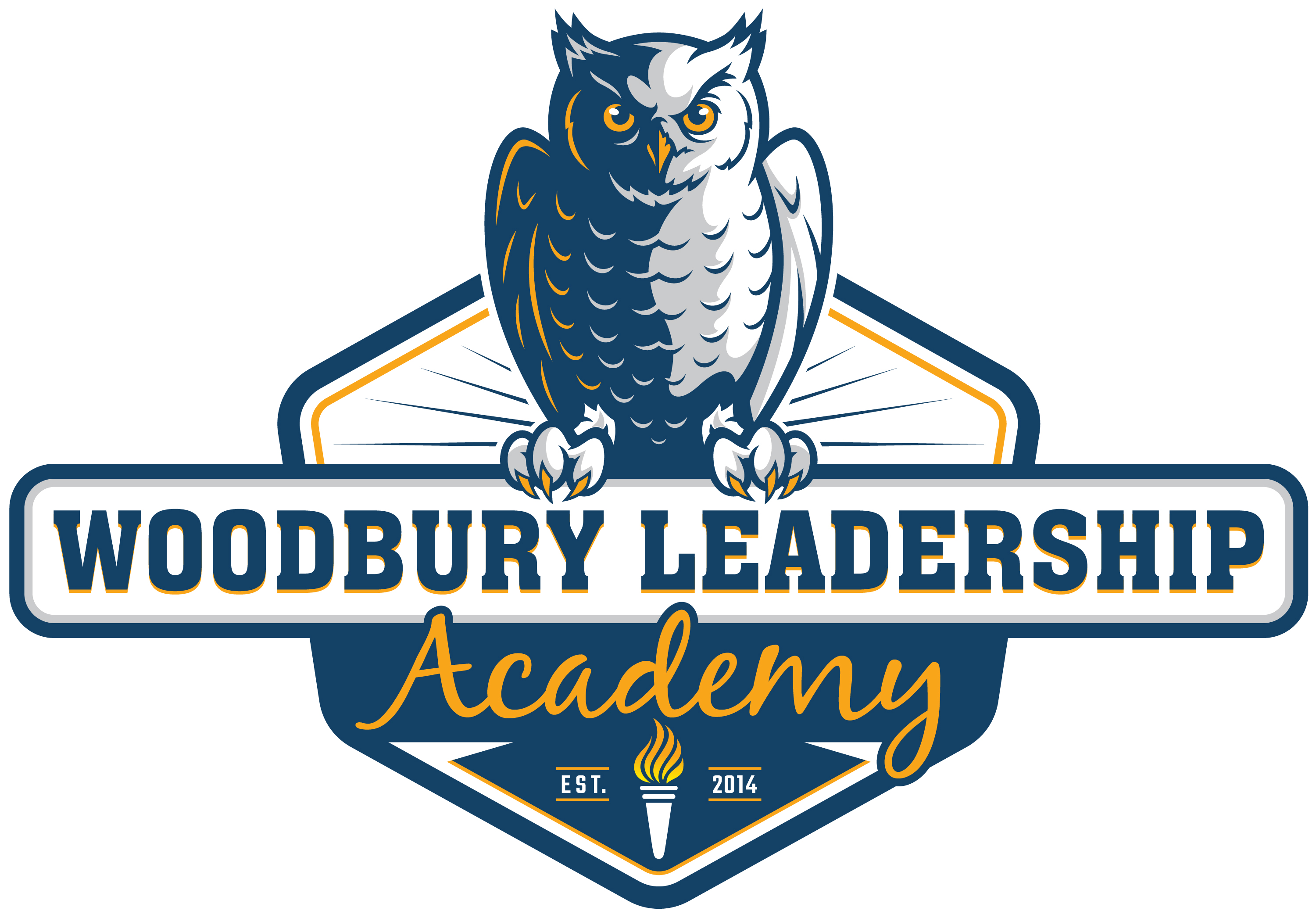Academics
Woodbury Leadership Academy uses the research-based, academically rigorous Core Knowledge Sequence to ensure that students meet and exceed the Minnesota Academic Standards. Core Knowledge is a solid, sequential, and specific curriculum, based on the principles of establishing a national cultural literacy, or broad common knowledge base.
 How WLA Fosters Academic Success:
How WLA Fosters Academic Success:
- Rigorous content organized by "Domains of Study"
- High expectations
- Inquiry-based learning
- Complementing knowledge and skills
- Family & community involvement
- Cross-curricular connections
- Specialist classes, including: Music, P.E., Art & Leadership
Many educators believe that schools are good at teaching and testing facts, but that students are not prepared to apply those facts to solving problems. Core Knowledge believes that for students to solve meaningful problems, they must first be supplied with knowledge about the domain of study. Skills and knowledge should complement each other.
The subject matter covered in Core Knowledge Sequence is rigorous. Students are exposed to multiple "Domains of Study" and content-rich vocabulary. Additionally, students are expected to move at a fast pace, as there are many "Domains of Study" in each grade level that must be covered. For students to be successful in this rigorous environment, families must be involved in their child's education.
Core Academics
Specialist Classes
Core Knowledge Language Arts (CKLA)
(1) Awareness of Noises & Words & Prewriting Skills
(2) Sounds & Word Blending & Prewriting Skills
(3) Sounds & Spelling: m, a, t, d, o, c, g & i
(4) Sounds & Spelling: n, h, s, f, v, z, p & e
(5) Sounds & Spelling: b, l, r u w j, y, x & k
(6) Alphabet, Letter Names, Four- & Five-Sound Words
(7) Sounds & Spelling: ch, sh, th, qu & ng
(8) Tricky Words: the, a of, all, one, from & was & Rhyming Words & Double-Letter Spellings
Core Knowledge History and Geography (CKHG)
(2) Native Americans
(3) Exploring and Moving to America
(4) The Mount Rushmore Presidents
Core Knowledge Science 2019 (CKSci) - IN PROGRESS
(1) Pushes and Pulls
(2) Needs of Plants and Animals
(3) Changing Environments
(4) Weather Patterns
(5) Our Five Senses
Ready Classroom Mathematics
(1) Numbers 0-5: Counting, Writing & Comparing
(2) Numbers 6-10: Counting Writing & Comparing
(3) Geometry: Naming, Comparing & Building Shapes
(4) Numbers Within 10: Addition & Subtraction
Core Knowledge History and Geography (CKHG)
(1) Continents, Countries and Maps
(2) Mesopotamia
(3) Ancient Egypt
(5) Early Civilizations of the Americas
(7) Early Explorers and Settlers
(8) From Colonies to Independence
Core Knowledge Science 2019 (CKSci) - IN PROGRESS
(1) Sun, Moon, and Stars
(2) Plant and Animal Survival
(3) Exploring Light and Sound
(4) Simple Machines
(5) Human Body Systems
Ready Classroom Mathematics - IN PROGRESS
(1) Numbers Within 10: Addition and Subtraction
(2) Numbers Within 20: Addition and Subtraction and Representing Data
(3) Tens and Ones: Counting, Place Value, Time and Money
(4) Operations with Tens and Ones: Addition and Subtraction
(5) Length: Comparing, Ordering and Measuring
(6) Geometry: Analyzing, Composing and Partitioning Shapes
Core Knowledge History and Geography (CKHG)
(1) Ancient India
(2) Ancient China
(4) Ancient Greece
(7) The War of 1812
(9) The Civil War
(10) Immigration and Citizenship
(11) Civil Rights Leaders
Core Knowledge Science 2019 (CKSci) - IN PROGRESS
(1) Properties of Matter
(2) Organisms and their Habitat
(3) Exploring Land and Water
(4) Electricity and Magnetism
(5) Human Cells and Digestion
Ready Classroom Mathematics - IN PROGRESS
(1) Numbers Within 20: Addition, Subtraction and Data
(2) Numbers Within 100: Addition, Subtraction, Time and Money
(3) Numbers Within 1,000: Place Value, Addition and Subtraction
(4) Length: Measurement, Addition and Subtraction and Line Plots
(5) Shapes and Arrays: Partitioning and Tilting Shapes, Arrays, Evens and Odds
Core Knowledge History and Geography (CKHG)
(1) World Rivers
(2) Ancient Rome
(3) Vikings
(5) Canada
(6) Exploration of North America
Core Knowledge Science 2019 (CKSci) - IN PROGRESS
(1) Investigating Forces
(2) Life Cycles, Traits and Variations
(3) Habitats and Change
(4) Weather and Climate
Ready Classroom Mathematics - IN PROGRESS
(1) Three-Digit Numbers: Place Value, Addition and Subtraction
(2) Multiplication and Division: Concepts, Relationships and Patterns
(3) Multiplication: Finding Area, Solving Word Problems, and Using Scaled Graphs
(4) Fractions: Equivalence and Comparison, Measurement and Data
(5) Measurement: Time, Liquid Volume and Mass
(6) Shapes: Attributes and Categories, Perimeter and Area and Partitioning
Core Knowledge History and Geography (CKHG)
(1) Using Maps
(2) World Mountains
(3) Medieval Europe
(5) Early and Medieval African Kingdoms
(8) The United States Constitution
(9) Early Presidents
(10) American Reformers
Core Knowledge Science 2019 (CKSci) - IN PROGRESS
(1) Energy Transfer and Transformation
(2) Investigating Waves
(3) Structures and Functions of Living Things
(4) Processes That Shape Earth
(5) Using Natural Resources for Energy
Ready Classroom Mathematics - IN PROGRESS
(1) Whole Numbers: Place Value, Comparison, Addition and Subtraction
(2) Operations: Multiplication, Division and Algebraic Thinking
(3) Multi-Digit Operations and Measurement: Multiplication, Division, Perimeter and Area
(4) Fractions, Decimals and Measurement: Addition, Subtraction and Multiplication
(5) Geometry and Measurement: Figures, Classification and Symmetry
Core Knowledge History and Geography (CKHG)
(1) World Lakes
(2) Maya, Aztec, and Inca Civilizations
(4) The Renaissance
(5) The Reformation
(7) Early Russia
(8) Feudal Japan
(9) The Geography of the United States
(10) Westward Expansion Before the Civil War
(11) The Civil War
(12) Westward Expansion After the Civil War
(13) Native Americans: Cultures and Conflicts
Core Knowledge Science 2019 (CKSci)
(2) Energy and Matter in Ecosystems
(4) Protecting Earth's Resources
Ready Classroom Mathematics - IN PROGRESS
(1) Whole Number Operations and Applications: Volume, Multiplication and Division
(2) Decimals and Fractions: Place Value, Addition and Subtraction
(3) More Decimals and Fractions: Multiplication and Division
(4) Measurement, Data and Geometry: Converting Units, Using Data and Classifying Figures
(5) Algebraic Thinking and the Coordinate Plane: Expressions, Graphing Points, Patterns and Relationships
Check out our WLA Homework Guidelines by clicking HERE.
Assessments
Woodbury Leadership Academy participates in statewide, national and district common assessments.
Statewide Assessments (MCA)
Minnesota values its educational system and the professionalism of its educators. Minnesota educators created the academic standards, which are rigorous and prepare our students for career and college. The statewide assessments are how Minnesota measures that curriculum and daily instruction in our schools are being aligned to the academics standards, ensuring all students are being provided an equitable education. Statewide assessment results are just one tool to monitor that we are providing our students with the education that will ensure a strong workforce and knowledgeable citizens.
(1) Minnesota Comprehension Assessments (MCA): Based on Minnesota Academic Standards; given annually in grades 3-8 and high school in reading and mathematics; given annually in grades 5, 8 and high school for science.
(2) Minnesota Test of Academic Skills (MTAS): Is an option for students with the most significant cognitive disabilities.
(3) ACCESS: Based on the WIDA English Language Development Standards; given annually to English learners in grades K-12 in reading, writing, listening and speaking.
Click HERE to view our District Test Security Procedure.
National Assessments (NWEA MAP)
At Woodbury Leadership Academy, we are committed to providing our students with personalized learning experiences. To best achieve this, we regularly assess students’ growth. We strive to consider the whole picture when serving our students. Having multiple types of assessments helps provide a fuller picture of each student's needs.
(1) Measures of Academic Progress (MAP) Reading Fluency with Dyslexia Screener Component: The MAP Reading Fluency with Dyslexia Screener Component is a test type that can identify when students' performance demonstrates possible risk factors for dyslexia or other reading difficulties. This is administered for all students in grades K-3.
(2) Measures of Academic Progress (MAP) Reading Growth: This is administered for all students in grades 3-8.
(3) Measures of Academic Progress (MAP) Science Growth: This is administered for all students in grades 5-8.
Common Assessments
Common Assessments are assessments that are directly linked to the curriculum taught at Woodbury Leadership Academy. They are based on academic standards and are typically developed by teacher teams within the school district. They are necessary to implement the district curriculum with fidelity and to report progress to students and parents on student mastery of academic standards (e.g., report cards).
How do we screen and identify for convergence insufficient disorder? We use parent and teacher referrals for concerns in this area. Those concerns are managed by the Special Education Director who ensures that students are tested accordingly.
For more information about Common Assessments, contact your child's teacher.
Statewide Assessments (MCA)
If you are considering opting your student out of statewide testing, please review the Minnesota Department of Education (MDE) Parent/Guardian Guide and Refusal for Student Participation in Statewide Testing. After reviewing the MDE document, if you would still like to opt your student out of statewide testing click HERE and complete the Woodbury Leadership Academy's Refusal for Student Participation in Statewide Testing Form. A new form must be filled out each school year. Please submit your refusal form to WLA's front office by March 10, 2024.
National Assessments (NWEA MAP)
To opt out of national assessments, the parent/guardian must complete THIS form and return to WLA. A new form must be filled out each school year.
Click HERE to view WLA's testing calendar for the 2023-2024 school year.
Spring MCA Schedule
|
Assessment |
Grades |
Date |
Time |
Location |
|
MCA Reading |
3-5 |
April 17th |
9:40-11:00 & 12:30-2:00 |
Classrooms |
|
MCA Reading |
6-8 |
April 17th |
10:15-11:50 & 1:00-2:30 |
Classrooms |
|
MCA Math |
3-5 |
April 24th |
9:40-11:00 & 12:30-2:00 |
Classrooms |
|
MCA Math |
6-8 |
April 24th |
10:15-11:50 & 1:00-2:30 |
Classrooms |
|
MCA Science |
5 |
May 1st |
9:45-11:20 & 12:15-1:15 |
Classrooms |
|
MCA Science |
8 |
May 1st |
9:30-12:00 |
Classrooms |
|
MCA Reading Make Up |
3-8 |
April 19th |
9:45-12:30 |
RM 356 |
|
MCA Math Make Up |
3-8 |
April 26th |
9:45-12:30 |
RM 356 |
|
MCA Science Make Up |
5 & 8 |
May 3rd |
9:45-12:30 |
RM 356 |
|
Final Make Up Day |
5-8 |
May 3rd |
1:00-3:30 |
RM 356 |

What is Core Knowledge?
The mission of the Core Knowledge Foundation is to advance excellence and equity in education for all children.
To achieve this mission, they offer detailed curricular guidance and materials to schools, teachers, parents, and policy makers—to anyone who believes, as we do, that every child in a diverse democracy deserves access to enabling knowledge.
The Core Knowledge approach puts knowledge at the heart of schooling.
Specific and Sequenced: Most curriculum standards provide general goals and objectives but offer teachers little guidance about the specific knowledge students should learn in each grade. In contrast, the Core Knowledge approach is to specify, in a clear grade-by-grade sequence, what students need to know.
Excellence and Equity: Only by specifying the knowledge and skills that all children should share can we guarantee equal access to that knowledge. Educational excellence and equity require that every child in a democracy have access to important shared knowledge and language.
Starting Early: It’s important to begin building strong foundations of knowledge in the early years. The Core Knowledge approach focuses on preschool through grade eight. In these early years, especially the preschool and elementary grades, schools can do the most to help children lay the groundwork for language development and future success.
To learn more about Core Knowledge, click HERE!

The Core Knowledge Sequence provides a detailed outline of content knowledge & skills to be taught in language arts, history and geography, mathematics, science, visual arts and music. The Sequence is intended to help children establish strong foundations of knowledge grade-by-grade. The Core Knowledge Sequence embodies three essential qualities: (1) content-specific, (2) cumulative & (3) coherent.
Reading Well by Third Grade
Click HERE to download WLA's Reading Well by Third Grade Plan 2023-2024
Click HERE to download WLA's Reading Well by Third Grade Plan 2022-2023.
Click HERE to download WLA's Reading Well by Third Grade Plan 2021-2022.
Click HERE to download WLA's Reading Well by Third Grade Plan 2019-2020.
